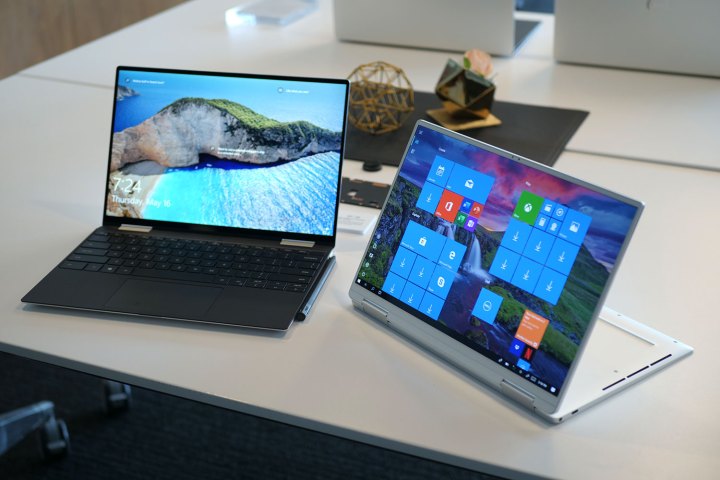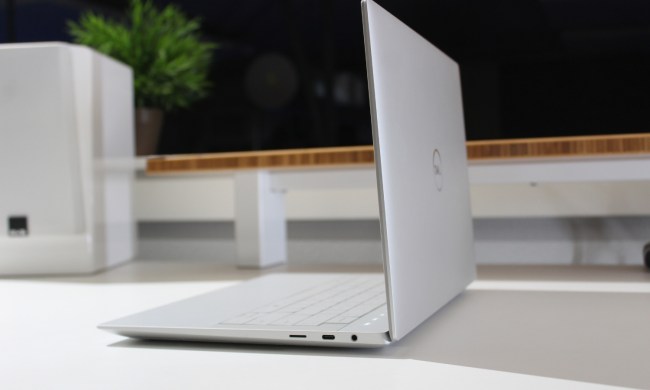
Two of the best laptops on the market — the clamshell Dell XPS 13 and the 360-degree convertible XPS 13 2-in-1 — have received significant updates, including the latest Intel processors and upgraded designs. But which is better?
Though full reviews are still on the way, we’ve now gone hands-on with both new laptops. Here’s our take on how the new Dell XPS 13 and the Dell XPS 13 2-in-1 compare based on our impressions so far.
Design

The XPS 13 hasn’t received much of a design update since its previous version. In fact, it’s essentially the same — and there’s nothing wrong with that. It’s a good-looking clamshell laptop with some of the tiniest bezels around, fitting a 13.3-inch display into one of the smallest chassis around. The XPS 13 2-in-1 is a different story. It’s received a number of important design updates from its previous version, making it a more cohesive member of the line. It now much more resembles the XPS 13, with the same tiny bezels, the same aluminum silver lid, and identical black or white interiors. The XPS 13 also offers a rose gold color scheme for a little more panache.
Both laptops maintain Dell’s attention to detail, with solid build quality that exudes confidence as you’re carting them around and getting your work done. In terms of their size and weight, the XPS 13 comes in at 0.46 inches thick and 2.64 pounds compared to the XPS 13 2-in-1 at 0.51 inches and 2.9 pounds.
While the XPS 13 retains its snappy keyboard from its most recent versions (an improvement over the mushier version of several versions earlier), the XPS 13 2-in-1 inherits a version of the maglev keyboard from the larger XPS 15 2-in-1. We prefer the XPS 13’s deeper travel, but if you like short-travel keyboards with a very snappy feel, then the 2-in-1’s version will work well for you. Both laptops enjoy relatively large Microsoft Precision touchpads with excellent and precise support for the full gamut of Windows 10 multitouch gestures, and of course, the XPS 13 2-in-1 supports Dell’s active pen for handwriting. The XPS 13 has touch displays available as well.
The XPS 13 retains the same touch and non-touch Full HD display options, but bumps the resolution up to 1920 x 1200 with good contrast and colors, and at the highest end you can upgrade to a 4K (3840 x 2400) touch display with excellent colors and contrast.
The XPS 13 2-in-1 continues with its 16:10 aspect ratio that’s designed to show more information on the screen at once and work better for handwriting. The display will come in two resolutions: The first is a 4K UHD+ (3840 x 2400) that will offer a 1,500:1 contrast ratio and 500 nits of brights to go with an extremely wide color gamut. The base resolution comes in at 1920 x 1200, which is a bit closer to a standard 1080p model. We prefer the taller screen of the XPS 13 2-in-1, and we’d be surprised if Dell didn’t bring that panel to its flagship at some point in the future.
Finally, connectivity is in an interesting transition. The clamshell comes with two USB-C with Thunderbolt 4 ports and a microSD card reader, but drops the extra USB-C port from the previous model. The latest XPS 13 2-in-1 has also updated to two Thunderbolt 4 ports and a microSD card reader. Both laptops utilize the Killer AX1650 Wi-Fi card, offering support for the latest Wi-Fi 6 standard.
Performance

The newest XPS 13 uses Intel’s 11th-gen Tiger Lake chips, a refreshing comeback with A.I. performance boosts and higher frequencies that give the four-core, eight-thread CPU a unique identity — and better performance than you might expect from a chip with limited core numbers.
The XPS 13 2-in-1 has also upgraded to 11th-gen processers, starting with the Core i3-1115G4, just like the XPS 13. However, when exploring upgrades the XPS 13 switches over to more powerful versions of the CPU earlier, which makes it easier to improve processor performance without resorting to the highest-end option.
Only the base models for each laptop use Intel UHD Graphics with shared memory. The others upgrade to the new Intel Iris Xe, a new approach to integrated graphics with better results: In our tests, we were very impressed with the performance of Iris Xe, and this could be a worthy upgrade for those who wish their XPS could handle gaming better.
However, with such similar specs, there really isn’t much differentiation to be found here.
Portability

As we noted, the XPS 13 is smaller and slightly lighter. But the XPS 13 2-in-1 is equally easy to carry around.
Battery life remains a mystery, though. The XPS 13 has a 52 watt-hour battery inside, while the XPS 13 2-in-1’s battery is slightly smaller at 51 watt-hours. Dell claims the XPS 13 will get 21 hours of battery life, while it promises the XPS 13 2-in-1 will get 16 hours.
We don’t expect either of these machines to necessarily live up to those claims, but it sounds like the XPS 13 will win out in the long run. That could be due to the higher-resolution screen on the XPS 13 2-in-1, or it could just be a matter of power efficiency. As always, the configurations paired with 4K displays will get the least battery life.
Two siblings battle it out for the throne

Because the features on these laptops are so similar, one of the main factors to consider is the difference in price between them.
You will have to shell out some extra cash for the XPS 13 2-in-1’s coveted adaptability. The base model of the XPS 13 (new 2020 version) starts at only $999.99, and the 2-in-1 model costs a hundred dollars more, so $1,099.99. Both models are currently available for purchase.
Upgraded specs increase the price of the XPS 13 2-in-1, too, but the price differences start to shrink as they climb. The final version of the XPS 13 stops at $1,899.99, and the 2-in-1 only costs $1,949.99. For an additional 50$, you can use the XPS 13 2-in-1 on your tablet. If you’ve committed to shelling out for the XPS 13, an extra 50$ is considerably cheap for the value that feature adds.
If you don’t currently own a tablet, the XPS 13 is a product that won’t break the bank or skimp out on the quality standards set by its competitors.
We have found the best Black Friday Dell XPS deals for you to further assist you in your quest for high-quality yet affordable laptops. We’ve even scoped out other Black Friday discounts.


